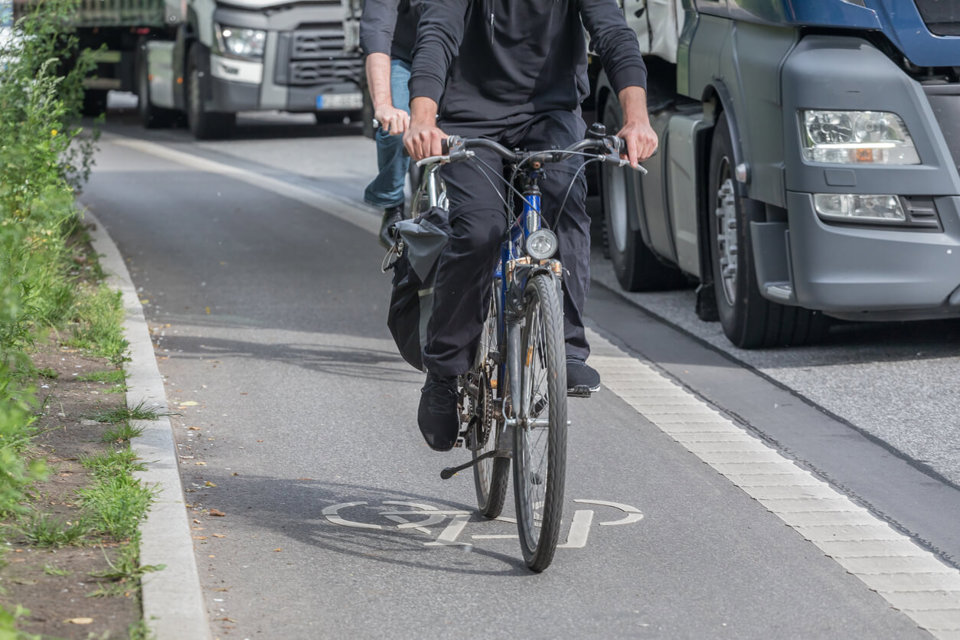Transport for London has launched the first consultation into the use of its world-first ‘zero to five star’ Direct Vision Standard (DVS) for HGVs operating in the capital.
The 12-week consultation runs until April 18 and aims to identify how the new standard can be best used to reduce road casualties on London’s roads.
Under the Mayor’s plans, the most dangerous HGVs will be banned from London’s streets entirely by January 2020.
These HGVs, often ‘off-road’ lorries, would be ‘zero-star rated’ by the DVS – determined by the level of vision the driver has directly from the cab.
By setting out their plans now, TfL expect many dangerous lorries will be upgraded before the restriction on the most dangerous HGVs comes into place in 2020.
Recent data shows that HGVs were involved in 22.5% of pedestrian fatalities and 58% of cyclist fatalities on London’s roads in 2014 and 2015, despite only making 4% of the miles driven in the capital.
TfL has also published research which shows that having direct vision from the cab of a lorry rather than relying on mirrors and monitors has a substantial impact on improving road safety for pedestrians and cyclists.
As part of the research, a simulator was used to replicate a real-life driving situation, and it showed that the amount of direct vision a driver has could be a crucial factor in allowing a dangerous collision to be avoided.
The study showed that drivers respond, on average 0.7 second slower when checking blind spots and monitors compared to directly through the windows.
This delay can result in a lorry travelling an extra 1.5 metres before seeing a nearby road user, enough to cause death or serious injury.
TfL and the Greater London Authority will include the new DVS in new contracts from April. This will help further stimulate the market for safer lorries with improved direct vision.
Sadiq Khan, Mayor of London, said: “This new research shows how important it is we take bold action to address dangerous and poorly designed lorries operating in the capital.
"HGVs with poor vision of cyclists, pedestrians and other road users from their cabin should simply not be allowed on London’s roads. Every time someone is killed by a lorry on London’s roads it is an appalling tragedy.
“Our ground-breaking DVS will be the first of its kind in the world, and TfL will lead by example by not using any zero-star lorries in its future supply chain."
Leon Daniels, managing director of surface transport at TfL, said: “Our Direct Vision Standard will not just increase safety, it will improve how our streets are used.
"We now know that another benefit of being able to make eye contact with a driver is that it makes pedestrian and cyclists feel safer, and this feeling can make our streets nicer places to live in and visit.”
However, the Freight Transport Association (FTA) has reacted with concern to the Mayor of London’s consultation paper.
Christopher Snelling, FTA’s head of national and regional policy, said: “Direct vision is clearly a benefit in safety and FTA has advised operators for many years to procure vehicles with the best possible sightlines.
"However, there are limits to the benefits, which means regulating in this way may not be the best answer to improving safety on our roads.
“Research for TfL has shown that no amount of direct vision would help in most cyclist incidents.
"Technology may prove a better route to minimising casualties as quickly as possible.
"Following advice from TfL, many operators have invested in cameras and sensors to eliminate blind spots around cabs with apparent success, as the rates of cyclist safety in London interacting with HGVs have improved significantly in recent years.
"But now that work is to be mostly ignored as it is not accounted for under the DVS.”
Snelling added: “What London business really needs now is clarity concerning the vehicles which will be affected. Many operators are now in the invidious position of needing to procure vehicles to prepare for the Ultra Low Emission Zone in 2019, and yet cannot do so due to the uncertainty over which vehicles will be allowed on London’s roads in 2020 or 2024.
"Vehicle design is a global industry and these discussions are best carried out at a European or UN level.
"But if London is to proceed with this approach, it needs to be ready to make the plan work for logistics so that small hauliers are not pushed out of business.
"Above all, the benefits of current and future technological solutions must not be ignored.”


















Darren Varney - 26/01/2017 14:08
How about making a cycling test compulsory? Get cyclists to identify that BIG lorries can squash them, and stop penalising lorry drivers